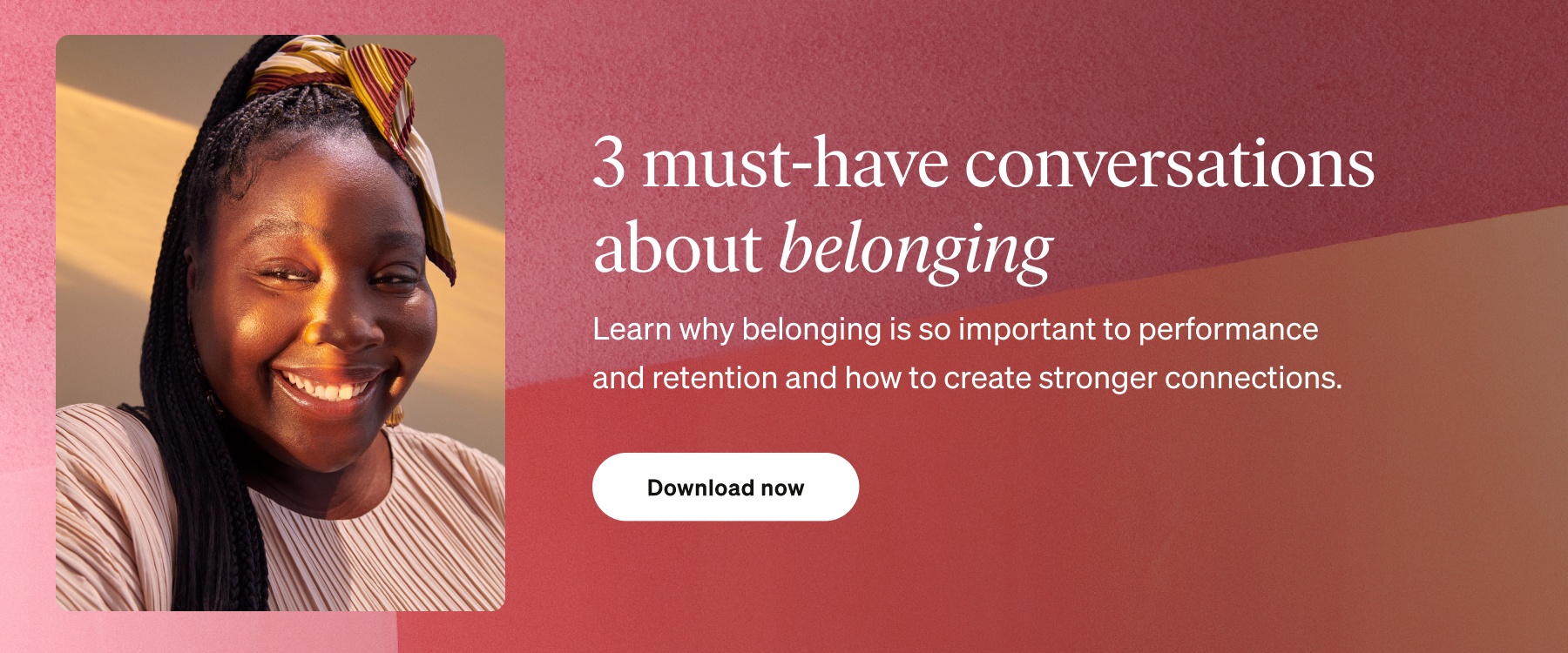Jump to section
Why is social connectedness important?
How does social connection impact physical and mental health?
How can you improve your social connections and connectedness?
For Business
Products
Build leaders that accelerate team performance and engagement.
Drive productivity through sustained well-being and mental health for all employees with BetterUp Care™.
Solutions
Transform your business, starting with your sales leaders.
Foster a culture of inclusion and belonging.
Customers
See how innovative companies use BetterUp to build a thriving workforce.
Resources
Best practices, research, and tools to fuel individual and business growth.
View on-demand BetterUp events and learn about upcoming live discussions.
The latest insights and ideas for building a high-performing workplace.
Innovative research featured in peer-reviewed journals, press, and more.

Jump to section
Why is social connectedness important?
How does social connection impact physical and mental health?
How can you improve your social connections and connectedness?
Social connection refers to our relationships with the people in our network.
Yet, this doesn’t reflect the quality of our relationships. Social connection is really about connectedness: the extent to which we engage with important, supportive people in our lives in ways that heighten our sense of belonging and well-being.
Stay up to date with new resources and insights.
Thank you for your interest in BetterUp.
The need to connect with other human beings is programmed in our DNA. We are wired for social connection. Since prehistoric time, people have lived together in groups where they found protection, help, support, common identity and shared knowledge.
Throughout history, families lived under the same roof, where the young cared for infants and old, incapable to fare for themselves.
However, our gregarious behavior changed with the development of big urban centers, frequent job changes, family disintegration or physical distancing, progress of technology, hectic lifestyles and intense work schedules and demands.
We are more “connected” than ever (social media, WhatsApp, Zoom), but we lack connectedness or a sense of belonging to a group or community. Research shows that many adults feel more isolated and lonely than ever. Sadly, loneliness and isolation can create a reinforcing cycle that makes meaningful social connection and a feeling of connectedness harder to achieve. This slowly, but steadily takes a toll on our physical and mental well-being. The negative effects show up in our performance at work, in our personal lives, and in our ability to weather disruptions, uncertainty, and setbacks.
It isn’t so much the struggles with external factors that bring people down as it is the sense of facing difficulties alone versus being in it together.
Medical science has been writing for years about the importance of social interactions as a critical component for health, happiness and longevity.
The effect of social connectedness on our lives is so strong that when we feel rejected or suffer some other type of negative social interaction, our brain feels “hurt” in the same way than when we feel physical pain. Social pain is more similar to physical pain than we think.
Consider the influence of low social connection on our health:
In contrast, high social connection and connectedness benefit our health in many ways. People who feel connected to others tend to experience better functioning physically, emotionally, and cognitively.
Research has shown that people actually perceive the world around them differently when they feel connected and supported by others. Happiness expert Shawn Achor describes research that people actually judge a hill to be 30 percent steeper if they are alone rather than with someone by their side. Challenges don’t seem quite so daunting when we feel the support of social connectedness.
The strength of our close social connections--with friends, family, neighbors, coworkers--is powerful for our overall sense of happiness and well-being.
Living on a different continent and almost seven thousand miles away from my direct family, I know first-hand how important it is to cultivate a connectedness to people I can count on for listening, sharing or support or just spending time or engaging in activities together.
While deep connections with our “confidants” seem to be the most beneficial, even the more casual and informal ones can have a positive effect on our well-being. So, the important thing is to start building connections.
Finally, remember that life teaches us every day that our most wonderful, inspiring, happy, funny, sad, or dreadful moments have to do with people in our lives.
What keeps us healthy, meaningful, and fulfilled in our life is not money, power, or fame, but the quality of our social ties. Making an effort to nurture and strengthen your relationships will have the most impact on your life and the biggest return in happiness. 
BetterUp Fellow Coach
Products
Solutions
Customers